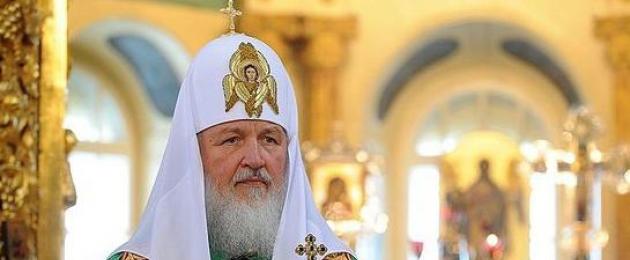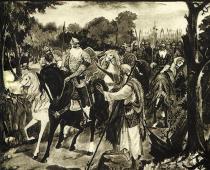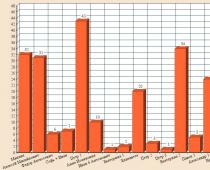An unfortunate event took place in the life of world Orthodoxy: its center, Constantinople, was captured by the Turkish conquerors. Golden crosses over the domes of temples were replaced by Ottoman crescents. But the Lord was pleased to revive the greatness of His church in the Slavic lands. The patriarchate in Russia became a symbol of Moscow's inheritance of the religious leadership of the overthrown Byzantium.
Independence of the Russian Church
Long before the establishment of the patriarchate in Russia officially took place, the dependence of the Russian Church on Byzantium was only nominal. From the beginning of the 15th century, Orthodox Constantinople was threatened by its constant enemy, the Ottoman Empire. Counting on the military support of the West, he was forced to give up religious principles and conclude a union (alliance) with the Western church at the Council of 1438. This hopelessly undermined the authority of Byzantium in the eyes of the Orthodox world.
When the Turks captured Constantinople in 1453, the Russian Church became practically independent. However, the status that gave it full independence had to be legitimized in accordance with the then existing canonical rules. For this purpose, Patriarch Jeremiah II of Constantinople arrived in Moscow, who on January 26, 1589, appointed the first Russian Patriarch, Job (in the world of John).
This act was destined to take place in the Assumption Cathedral of the Kremlin. Records of contemporaries testify that all of Moscow then gathered on the square, thousands of people on their knees listened to the gospel of the cathedral bells. This day has become one of the most significant in the history of the Russian Orthodox Church.
The following year, the Council of the Eastern Hierarchs finally secured the status of autocephalous, that is, independent, for the Russian Church. True, in the "Diptych of the Patriarchs" - the established order of their enumeration - Patriarch Job was given only the fifth place, but it was not a derogation from his dignity. The Russian people accepted this with due humility, realizing the youth of their church.

The role of the king in the establishment of the patriarchate
There is an opinion among historians that the introduction of the patriarchate in Russia was initiated personally by the sovereign. The chronicles of that time tell how, during his visit to Moscow, Patriarch Joachim of Antioch was received by the tsar, and at the liturgy, Metropolitan Dionisy, approaching the distinguished guest, blessed him, which, according to the Charter of the Church, was completely unacceptable.
In this gesture, they see the tsar's hint at the establishment of a patriarchate in Russia, since only a bishop, equal in rank to a foreign patriarch, could do such a thing. This action could be performed only on the personal instructions of the king. So Theodore Ioannovich could not stay away from such an important matter.
First Russian Patriarch
The choice of the candidature of the first patriarch was very successful. From the very beginning of his reign, the newly elected primate launched an active work to strengthen discipline among the clergy and raise their moral level. He also put a lot of effort into enlightening the broad masses of the people, teaching them to read and write and distributing books containing the Holy Scriptures and the patristic heritage.

Patriarch Job completed his earthly life as a true Christian and patriot. Rejecting all lies and unscrupulousness, he refused to recognize False Dmitry, who was approaching Moscow in those days, and was imprisoned by his supporters in the Assumption Staritsky Monastery, from which he emerged sick and blind. By his life and death, he showed to all future primates a sacrificial example of serving the Russian Orthodox Church.
The Role of the Russian Church in World Orthodoxy
The church was young. Despite this, the Russian hierarchs enjoyed undeniable authority among the representatives of the higher clergy of the entire Orthodox world. Often he relied on economic, political and even military factors. This became especially evident after the fall of Byzantium. The eastern patriarchs, deprived of their material base, were constantly forced to come to Moscow in the hope of receiving help. This went on for more than a century.
The establishment of the patriarchate played an important role in strengthening the national unity of the people. This manifested itself with particular force in the Time of Troubles, when it seemed that the state was on the verge of losing its sovereignty. Suffice it to recall the selflessness of Patriarch Hermogenes, who, at the cost of his own life, managed to rouse the Russians to fight against the Polish invaders.
Elections of Russian Patriarchs
The establishment of the patriarchate in Moscow, as mentioned above, was made by the Patriarch of Constantinople Jeremiah II, but all subsequent primates of the church were elected by the highest Russian church hierarchs. For this purpose, on behalf of the sovereign, an order was sent to all bishops to come to Moscow to elect a patriarch. At the beginning, an open form of voting was practiced, but over time it began to be carried out by lot.

In subsequent years, the succession of the patriarchate lasted until 1721, when it was abolished by decree of Peter I, and the leadership of the Russian Orthodox Church was entrusted to the Holy Synod, which was only a ministry for religious affairs. This forced headlessness of the church continued until 1917, when it finally regained its primate in the person of Patriarch Tikhon (V.I. Belavin).
Russian Patriarchate today
At present, the Russian Orthodox Church is headed by its sixteenth primate, Patriarch Kirill (V.M. Gundyaev), whose enthronement took place on February 1, 2009. On the patriarchal throne, he replaced Alexy II (A.M. Ridiger), who ended his earthly path. From the day when the establishment of the patriarchate in Russia took place, and up to the present time, the patriarchal throne has been the foundation on which the entire building of the Russian church is based.

The current Russian primate carries out his archpastoral obedience, relying on the support of the episcopate, the clergy, and the broad masses of the parishioners. It should be noted that, according to church tradition, this high rank does not endow its owner with any exceptional holiness. In the council of bishops, the patriarch is only the eldest among equals. He makes all his key decisions on managing the affairs of the church collegially with other bishops.
- In contact with 0
- Google Plus 0
- OK 0
- Facebook 0








